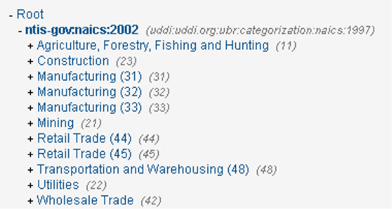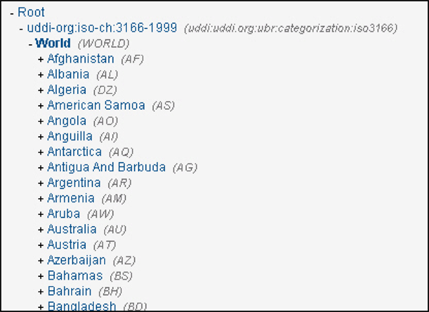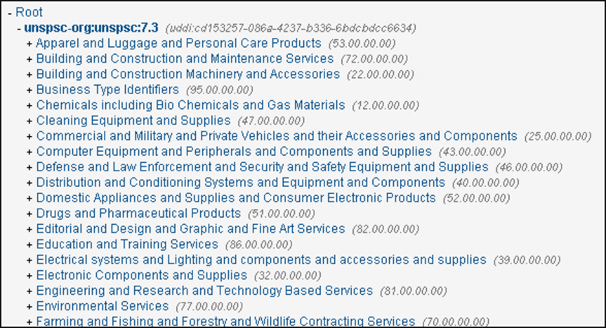Registry Reference
Includes WSDL Entity Type tModels, UDDI Category tModels, Policy Manager Category tModels, and Business Taxonomy tModels.
Table of Contents
- Identifier Scheme Types
- WSDL Entity Type tModels
- UDDI Category tModels
- Policy Manager Category tModels
- Business Taxonomy tModels
Identifier Scheme Types
Identifier Schemes (also referred to as Identifier tModels) are used to logically group Providers by a common form of identification. Notes:
- Identifiers are optional descriptions and are intended to enhance the discovery of business providers and services in search operations.
- Identifiers are generally trade-focused and indicate the identity of the businessEntity or publishing party associated with the business providers and services. Some examples are:
- D-U-N-S numbers
- Global Location Number (GLM)
- Tax identifiers
- Inclusion of identifiers in your business providers and services definitions enhances the search process by providing a mechanism that allows you to more efficiently focus your business searches.
The Identifier information is configured using a <keyedReference> tag that is stored in the businessEntity under the identifyBag construct. The key data includes:
- tModelKey—The tModel key associated with the identifier information.
- keyName ()—The human-readable name assigned to the identifier.
- keyValue()—The internal system identifier id of the identifier.
The Identifiers Summary page allows you to view current identifiers, assign identifiers, and unassign identifiers for the current Provider definition.
The following identifier schemes are provided with the default installation:
- digev-com:clientsdkurllookup—Policy Manager WSClientSDK Identifier Binding lookup scheme.
- digev-com:identification—Subsystem Identification System.
- digev-com:jms_properties—Policy Manager Properties to support SOAP over JMS.
- dnb-com:D-U-N-S—The Dun & Bradstreet registry, an industry-focused identifier scheme that specifies the Dun & Bradstreet D-U-N-S Number identifier.
- thomasregister-com:supplierID—The Thomas Registry, an industry-focused identifier scheme that provides a comprehensive online resource for finding companies and products manufactured in North America.
WSDL Entity Type tModels
Note: The WSDL Technote Category Schemes are reserved for system use and cannot be deleted.
- uddi-org:wsdl:categorization:protocol—Category system used to describe the protocol supported by a wsdl:binding.
- uddi-org:wsdl:categorization:transport—Category system used to describe the transport supported by a wsdl:binding.
- uddi-org:wsdl:portTypeReference—A category system used to reference a wsdl:portType tModel.
- uddi-org:wsdltypes—WSDL Entity Type Category System.
- This mapping uses a number of UDDI entities to represent the various entities within a WSDL document.
- A mechanism is required to indicate what type of WSDL entity is being described by each UDDI entity.
- The WSDL Entity Type tModel provides a typing system for this purpose.
- This category system is used to indicate that a UDDI entity represents a particular type of WSDL entity.
- uddi-org:xml:localName—A category system used to indicate XML local names.
- uddi-org:xml:namespace—A category system used to indicate namespaces.
UDDI Category tModels
- uddi-org:category_types—UDDI Types Category System. A category scheme that provides a listing of valid values from uddi-org:types for categorizing tModels that will be published.
- uddi-org:xml:namespace—A category system used to indicate namespaces.
Policy Manager Category tModels
- digev-com:categorization—Subsystem Category System
- digev-com:managementpoint:discoveredservice:relationship—Services MP Relationships Category System
- digev-com:service type categorization—Service Type Category System
- digev.com:metadata—Custom Metadata Category System
- digev.com:notification_status—Notification Status System
- ntis-gov:naics:2002—2002 North American Industry Classification System
- soa-com:organization type categorization—Organization Type Category System
- soa-com:servicelifecyclestage—Service Lifecycle Stages
- soa-com:servicemanager:servicerelationship—Policy Manager Service Relationships Category System
- soa-com:serviceversion—Service Version
- soa-com:wsdl:location—Main WSDL Location
- uddi-org:category_types—UDDI Types Category System
- uddi-org:entityKeyValues—Category system used to declare that a value set uses entity keys as valid values
- uddi-org:general_keywords—UDDI General Keyword Category System
- uddi-org:iso-ch:3166-1999—ISO 3166-1:1997 and 3166-2:1998.
- Codes for names of countries and their subdivisions.
- Part 1: Country codes.
- Part 2: Country subdivision codes.
- Update newsletters include ISO 3166-1 V-1 (1998-02-05), V-2 (1999-10-01), ISO 3166-2 I-1 (1998).
- uddi-org:nodes—Category system for identifying nodes of a registry
- uddi-org:wsdl:categorization:protocol—Category system used to describe the protocol supported by a wsdl:binding
- uddi-org:wsdl:categorization:transport—Category system used to describe the transport supported by a wsdl:binding
- uddi-org:wsdl:portTypeReference—A category system used to reference a wsdl:portType tModel
- uddi-org:wsdl:types—WSDL Type Category System
- uddi-org:xml:localName—A category system used to indicate XML local names
- uddi-org:xml:namespace—A category system used to indicate namespaces
- uddi:soa.com:dynamicbinding:lookup—SOA Service dynamic binding tmodel to dynamically bind to service by identifier
- uddi:soa.com:serviceendpoint:connprop:string—SOA service endpoint connection property
- uddi:soa.com:serviceendpoint:containername—SOA Service endpoint container tmodel
- uddi:soa.com:serviceendpoint:contextpath—SOA Service endpoint context path
- uddi:soa.com:serviceendpoint:listenername—SOA Service endpoint listener tmodel
- uddi:soa.com:serviceendpoint:msgprop:string—SOA service endpoint message property
- uddi:soa.com:serviceendpoint:protocolvar—SOA service endpoint protocol variant
- uddi:soa.com:serviceendpoint:weight—SOA Service endpoint weight tmodel
- uddi:soa.com:wsdl:schemareference—A category system used to reference a schema tModel
- unspsc-org:unspsc:7.3—Universal Standard Products and Services Classification (UNSPSC) Version 7.3
Business Taxonomy tModels
ntis-gov:naics:2002
NORTH AMERICAN INDUSTRY CLASSIFICATION SYSTEM (NAICS) taxonomy. Provides:
- Common definitions of the industries within the three North American countries.
- A common statistical framework for analyzing statistical data relating to industry and the economy.

uddi-org:general_keywords
GENERAL KEYWORDS TAXONOMY. Provides a method of defining unchecked taxonomies, each consisting of a namespace identifier and an associated set of category values. Unlike other taxonomies, the Key Name and Key Value attributes of the keyedReference elements are semantically meaningful.

uddi-org:iso-ch:3166-1999
ISO 3166 GEOGRAPHIC TAXONOMY. A geographic taxonomy that provides codes for names of countries and their subdivisions. This categorization scheme can be used to indicate that a business or service serves a particular geographic area.

unspsc-org:unspsc:73
UNIVERSAL STANDARD PRODUCTS AND SERVICES CLASSIFICATION (UNSPSC). An industry-focused category scheme that allows you to code products and services according to a naming standard agreed for a specific industry.
